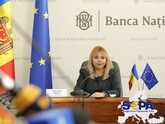
The Moldovan government has approved the Energy Sector Digital Transformation Program for 2026-2030, which requires investments of 1 billion 807.8 million lei (92 million euros) for its implementation
This document was developed by the Moldovan Ministry of Energy with the support of UNDP in Moldova and the Italian government. According to the Ministry of Energy, the implementation of this program will enable households to manage their energy consumption more efficiently by continuing to install smart meters, and the networks will be modernized, which will significantly reduce energy losses According to the document, by 2027, approximately 100,000 vulnerable households will be equipped with smart meters, and a total of 500,000 smart meters will be installed, which will cover at least 40% of consumer households, primarily vulnerable families, as well as the urban environment. The program will also make a significant contribution to improving the efficiency and modernization of energy networks, reducing losses by up to 10%, which will save about 200 million lei annually. The program will also reduce operating costs by 20-25% by 2030, providing more affordable tariffs for consumers and increasing the competitiveness of businesses. At the same time, real-time data on energy production, import, and consumption will be collected, analyzed, and provided. The information will be available to authorities, suppliers, and consumers. The digital transformation is also expected to have a significant impact on the transition to green energy. By 2030, the capacity for integrating renewable energy sources will increase from 150 to 600 MW. The program provides for the introduction of a National Consumption Register (RNLC), which will assign a unique code to each consumption site, ensuring transparency in billing, continuous monitoring, and quick change of suppliers. The program will contribute to achieving the goals of the Integrated National Energy and Climate Plan for 30% renewable energy use and Moldova's transition to a green economy. Energy Minister Dorin Junghietu noted that the digital transformation of the energy sector is a strategic priority for Moldova and brings concrete benefits to every citizen by reducing costs, increasing transparency, and providing effective tools for managing energy consumption, while strengthening the security and competitiveness of the sector. According to him, households will be able to control and optimize their energy consumption, effectively becoming managers of their own accounts, and the national economy will benefit from a more secure and efficient infrastructure. According to the Ministry of Energy, the investments required to implement the program are estimated at 1 billion 807.8 million lei for 2026-2030. Of this amount, approximately 247.8 million lei (13.7%) represents identified sources (allocated under existing programs, energy companies' own funds, and projects already underway), while approximately 1 billion 560 million lei (86.3%) represents the need for additional funding that must be mobilized. Potential sources of funding include: external grants (EU, international financial institutions, energy transition and digitalization funds); external loans and resources attracted through technical and investment assistance projects; own funds of energy sector operators allocated under investment and digitalization programs. As noted by the Ministry of Energy, although there is no guarantee that all sources will be identified immediately at this stage, approval of the program provides the legal and institutional prerequisites for initiating financing processes and negotiations with external partners. The investments required for the program are substantial but justified by the savings and benefits achieved: reduction of network losses (currently estimated at 15-20% of distributed energy), with annual savings for consumers of around 300 million lei; optimization of energy flows through digitalization, with additional savings estimated at 150 million lei/year; reduction of operating costs by 20-25% through process automation and the introduction of smart technologies; access to external financing by complying with EU standards and the eligibility conditions of international funds for the digitalization of the energy sector; reduction of the social costs of energy poverty, estimated at 1.2 billion lei annually, by increasing efficiency and access to modern energy services. “Thus, even with a significant need for additional funding, the cost-benefit ratio remains favorable, and phased or partial implementation is possible using existing sources,” the Ministry of Energy notes. // 08.10.2025 – InfoMarket.







